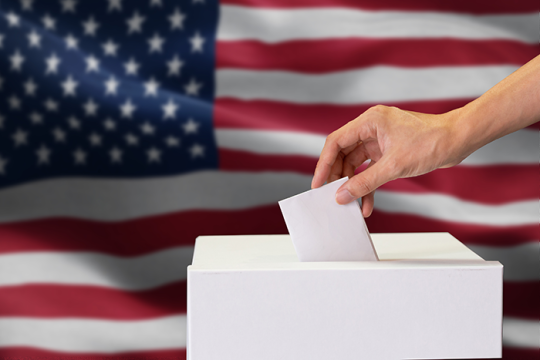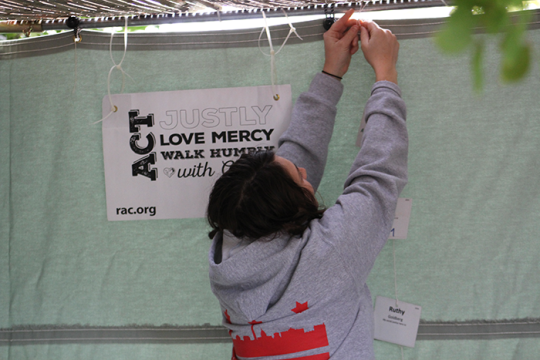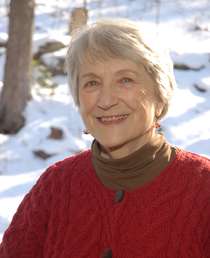
I have come to the Newtown Congregational Church, less than a half mile from Sandy Hook Elementary School, to attend an interfaith discourse about guns in our society.
The program opens with a showing of The Armor of Light, a film documenting Evangelist Reverend Robert L. Schenck’s change of heart about guns. A Jewish convert to Christianity, Rev. Schenck has become a leader in the “pro-life” movement, drawing national attention in 1992 when he displayed a preserved human fetus while leading demonstrations. He is now is president of Faith and Action, a Christian outreach organization in Washington, D.C., that directs its anti-abortion message to elected officials, U.S. Supreme Court justices and clerks, and other government officials and employees.
The Armor of Light, directed by Abigail Disney (grandniece of Walt Disney) takes its title from the New Testament: "Let us...cast off the works of darkness, and let us put on the armor of light" (Romans 13:12). It chronicles Rev. Schenck’s inner moral struggle following the 1998 shooting death of Dr. Barnett Abba Slepian, an obstetrician and abortion provider in Buffalo, N.Y. Questioning the value his movement places on human life, the reverend laments, “If my people are capable of this, I’m capable of this.”
As one mass shooting follows another, Rev. Schenck wonders whether being pro-gun is consistent with being pro-life. He acknowledges his “surprise by how much guns factor into the lives and spirituality” of his evangelical colleagues, who see their priority as protecting their wives and children.
Despite worries about losing the faith community that has given his life meaning, including Tea Party members, Rev. Schenck increasingly begins to doubt the NRA’s dictum, “The surest way to stop a bad guy with a gun is a good guy with a gun.” Recognizing that good people with guns can actually do bad things, he begins to believe something must be done and that “the time for the clergy to be brave is now.”
The film follows Rev. Schenck as he meets Lucy McBath, a deeply religious, pro-choice Christian whose African-American teenage son, Jordan Davis, was murdered in Florida while in a car with several unarmed friends. As McBath and the reverend discuss her tragedy, she tells him, “People have more faith in guns than they have in God.”
McBath says she feels God is directing her to use her grief to help overturn Florida’s so-called “Stand Your Ground” law, which removes the duty to retreat before using force in self-defense. It’s the same law that was used to exonerate George Zimmerman in the shooting death of another black teenager, Trayvon Martin. The reverend humbly responds to McBath, “I assume that, if given the opportunity to retreat, we’d all safely retreat.”
When the lights come back on at the Newtown Congregational Church, I see Rev. Schenck standing in front of the room alongside film director Abigail Disney. Rabbi Shaul Praver, a Sandy Hook first responder, prison chaplain, and former rabbi of Newtown’s Congregation Adath Israel, opens the discussion by saying, “The clergy in America are finally weighing in.”
Unfortunately, that may be an overstatement.
Rev. Schenck says the best public policy comes out of a “moral consensus” and that he needs to work with evangelicals – who, so far, “aren’t playing a helpful role.”
As might be expected in a town where 20 schoolchildren and eight adults died at the hands of a lone gunman, the audience is deeply concerned about gun violence in America. One attendee comments, “Stand Your Ground has distorted the Golden Rule into, ‘Do unto others before they do worse to you.’”
Several participants say that a lack of empathy is fundamentally a spiritual problem that leads to gun violence and to the political impasse that keeps us from finding a solution. With the NRA creating a stalemate in Washington, Rabbi Praver and Rev. Schenck suggest that spiritual communities around the country need to take responsibility for a new kind of conversation about gun safety – one that is “faith-based, features personal stories, and is respectful and empathic.”
As I leave the church, I take to heart Rabbi Praver’s admonition to listen carefully to those whose views differ from ours: “Never assume, as a liberal, that conservatives shed fewer tears over gun violence.”
Related Posts

Teens Make Their Voices Heard by Voting


